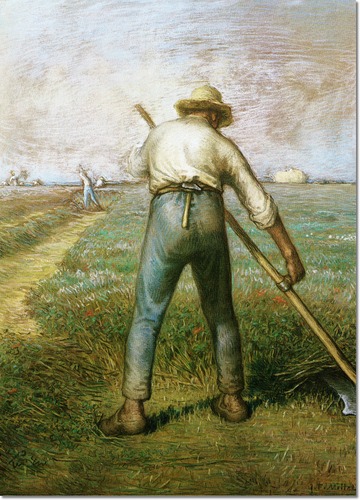ArtsVanGogh.com
Vincent van Gogh 1853-1890
Vincent van Gogh - The Reaper after Jean-Francois Millet 1889
The Letters of Vincent van Gogh
To Theo van Gogh. Arles, on or about Tuesday, 11 December 1888.
My dear Theo
Thank you very much for your letter, for the 100-franc note enclosed with it, and also the 50-franc money order.v
I myself think that Gauguin had become a little disheartened by the good town of Arles, by the little yellow house where we work, and above all by me.
Indeed, there are bound to be grave difficulties still to overcome here, for him as well as for me.
But these difficulties are rather within ourselves than elsewhere.
All in all, I think personally that he’ll either definitely go or he’ll definitely stay. I told him to think and do his sums again before acting.
Gauguin is very strong, very creative, but precisely because of that he must have peace. Will he find it elsewhere if he doesn’t find it here?
I’m waiting with absolute serenity for him to make a decision. Good handshake.
Vincent
Paul Eugène Milliet to Vincent van Gogh. Guelma, Tuesday, 11 December 1888.
My dear friend,
I haven’t written to you for such a long time that I feel the need to tell you a thousand things to gain forgiveness for my silence. However I’ll begin by asking you to accept my apologies. Since my arrival here I’ve toiled and continue to toil like a negro, hence from six o’clock in the morning to four thirty in the afternoon, I scarcely leave the barracks for long enough to eat, I spend the whole time standing in the blazing sun, shouting like a devil, so in the evening it’s with a certain pleasure that I see the moment coming when I can slide between the sheets, hence my shortage of time to write.
I shan’t tell you about my journey, which went very well. Pointless. Like all other countries, Algeria is only interesting for the visitor, from far away, like this, on paper, it comes across badly. Is that true? I’ve been thinking about Bernard. I’ve been working on his behalf as much as possible. The officer who commands my battalion is very well disposed towards him after what I said about him. Tell your friend to come to the 3rd Zouaves, he’ll then surely be near me, and when he does we’ll try to make his life as gentle as the job permits. It’s a great pity that he isn’t here now, because being in charge of the recruits as I am, the task would be a hell of a lot more simplified still.
Guelma is an absolutely indifferent town: any small village in France would be as pleasant. What really is beautiful is nature, the sun, the light, the types of Arabs, these people with billowing robes are superb. But what astonishes me is that, contrary to what you see in Europe, the paintings seem to be composed in the shade with a dark centre and corners in the light. It’s just like, if I dare say so, Rembrandt in reverse. At least that’s how I feel about things.
From my window I have a superb view: my horizon is formed by a line of small mountains running parallel from east to west and lost in the blue. From another side, I have a perfectly flat stretch of ground, of a rather indefinable colour, the areas nearest to the eye are yellowish; the parts that fade into the distance melt into violet greys (does this colour actually exist? In any case that’s what it seems to me), one last ash-grey line, but so thin it would take only a single slender stroke, determines the true depth of the countryside, which is truly very extensive. All of this is marvellous. I wish I could draw so as to depict it, but I can’t, alas.
How are you my dear friend, and how is Gauguin finding life down there? Is he getting used to it?
Write to me, if you have the time, you’ll give me very great pleasure.
Of course, I haven’t a single book to cast my eyes over, not even Balzacs at 1 franc 2 sous each. What a hole, what a hole! On top of that, impossible to get any. Have you unearthed Bel-ami?
Recall me, if you would, to your esteemed brother’s excellent memory. Hearty handshake for Gauguin, and believe me, my dear friend, your entirely devoted and faithful
P. Milliet
2nd Lieut. 3rd Zouaves
Guelma
Place de Constantine.
/45 The Reaper after Millet.jpg)
